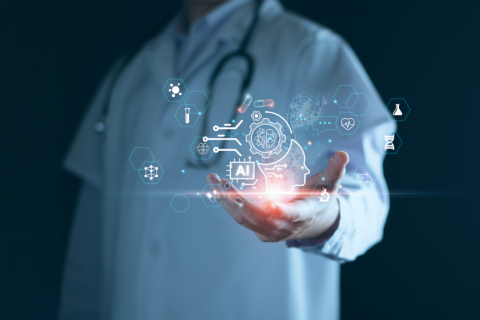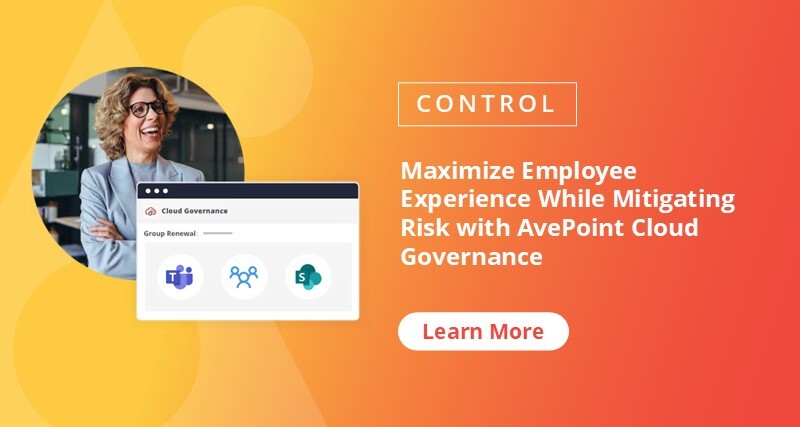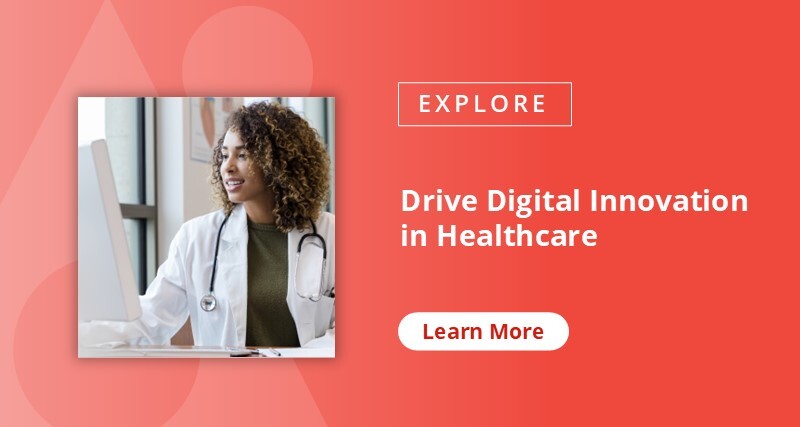The integration of artificial intelligence (AI) into healthcare is reshaping the industry, offering unprecedented advancements in efficiency and care quality. Yet, this transformation isn’t only about speeding up processes; it’s about enhancing human decision-making with AI as a supportive partner. While AI can optimize data-driven insights and streamline operations, the human element – qualities like empathy, resilience, and ethical judgment – remains indispensable in patient care. This synergy of AI and human touch is key to meeting the complex needs of modern healthcare and ensuring the most effective, compassionate patient outcomes.
AI Revolutionising Healthcare
AI offers transformative solutions that enhance patient care, streamline administrative tasks, and support healthcare professionals in delivering more effective treatments.
The below infographic shows six ways AI revolutionizes the healthcare industry:
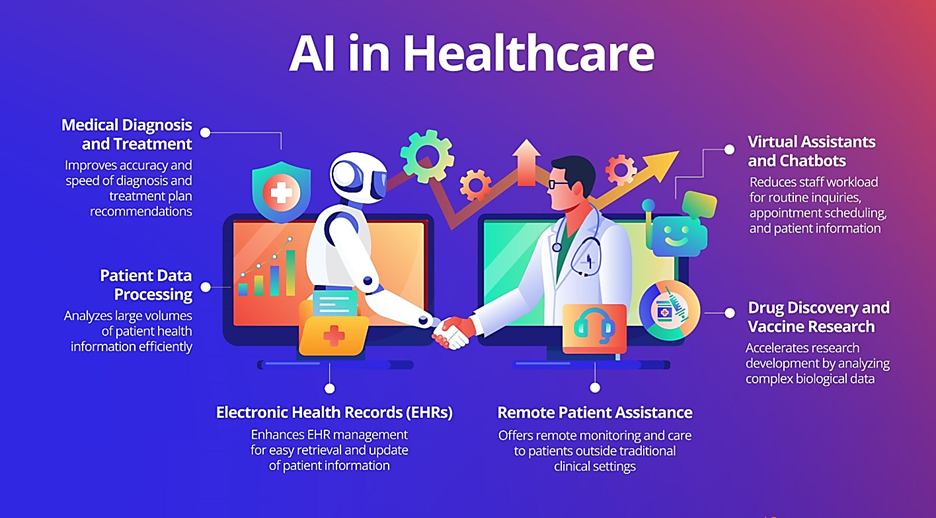
Patients Value Digital Services But Also Need Engagement
According to a 2024 patient survey by Tebra, 47% of U.S.-based patients feel their clinicians are not engaging with them adequately, highlighting that technology alone cannot bridge this gap. While AI can now process and analyse data at unprecedented speeds, some practical skills cannot be replaced by AI. For example, resilience is critical for frontline healthcare practitioners when dealing with life-and-death scenarios. Similarly, empathy in candid communication with patients’ families remains necessary for healthcare practitioners. Soft skills like these can only be practiced and honed in real-world situations, underscoring the importance of human interaction in healthcare.
To address this need for soft skills, healthcare companies are developing competencies mapped out to train staff, whether to speed up user adoption of newly implemented hospital systems, upskill healthcare practitioners in specialised skills tracks, or disseminate information across the workforce.
This involves setting up a reward system recognising the acquisition of new professional knowledge and skills, including soft skills, such as new patient management approaches, new equipment information, updated benefits, application of approved drugs, or new operational SOPs.
A learning management system (LMS) is an effective tool for healthcare practitioners, serving as a comprehensive knowledge repository and a convenient workplace assistant.
Scaling Information at the Point of Care
One critical challenge healthcare professionals face is scaling information at the point of care. Learning systems, such as MaivenPoint Curricula, can disseminate evidence-based medical information in a structured, understandable way, ensuring that caregivers are equipped with the latest knowledge without overwhelming them.
The reliance on technologies, such as Electronic Medical Records (EMR), can sometimes lead to burnout due to excessive data entry and complex or non-intuitive user interfaces. This makes it difficult to navigate information quickly and creates alert fatigue from volumes of notifications generated by operational systems. An LMS, like Curricula, comes with AI-powered user guides that intuitively offer step-by-step topical instructions to meet the exact system needs of their users.
In implementing organisation-wide LMS projects, it is also critical to factor in a broad spectrum of user needs for full alignment from the wider team. For example, learning tools should consult input from emergency care doctors and nurses in formulating greater inclusivity.
There are also broader enterprise decisions to consider when implementing LMS projects across an organisation. For instance, any excessively conservative IT regulations may work to inhibit medical practitioners from scaling any professional learning programmes within their operational workspaces. Exacerbated by a shortage of on-the-job professional trainers, this can stifle both the growth and adaptation of healthcare practices.
Drawing the Line During Decision-making
AI has the potential to improve productivity and synthesise information, but it also needs clear boundaries to ensure that decisions are not solely based on its suggestions.
Following the Observe, Orient, Decide, and Act (OODA) loop decision-making process, any diagnosis or medical advisory provided by an AI model should not be directly delivered to patients or facility visitors. While AI can be used for training people, it is not the best means of communicating with stakeholders, especially in frontline workforces that face ever-changing scenarios, several of which require ethical judgment.
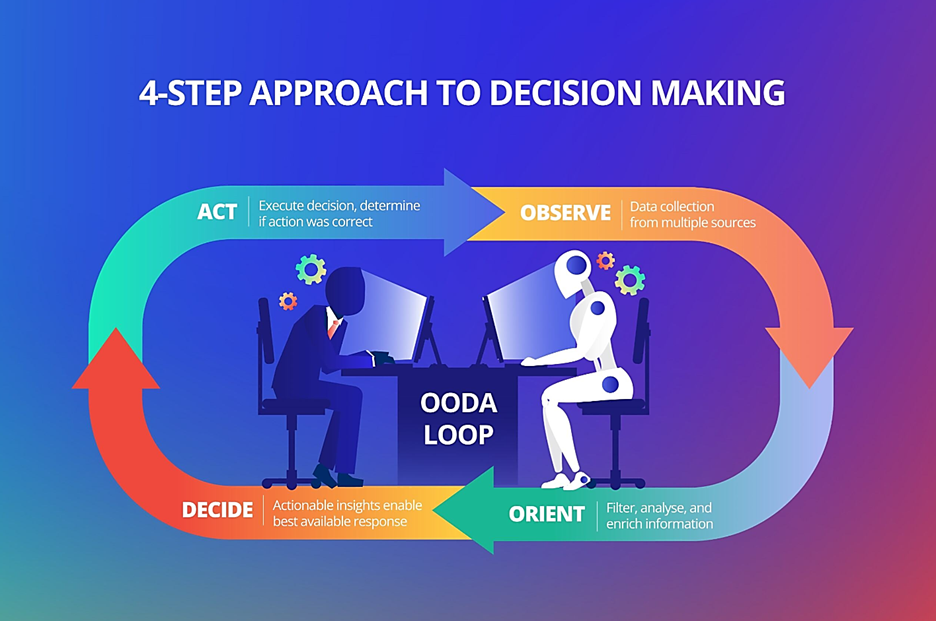
When considering the OODA loop, the inclusion of AI can expedite the Observe and Orient phases by ingesting large amounts of information and historical knowledge to provide contextual insights. However, human decision-making remains essential for the Decision and Action phases, where varied factors need to be balanced, especially for frontline teams in a range of industries that differ in their operations and where normal rules on paper do not always guarantee success in real-life situations.
The Role of Learning Platforms in Healthcare Transformation
As AI becomes an integral part of healthcare, a skills evolution among healthcare professionals is essential. To effectively integrate AI while preserving the human touch, healthcare workers need a blend of technical skills and soft skills that cannot be replaced by technology. Modern learning systems, such as robust LMS platforms, are vital for this transformation, supporting blended learning and scenario-based training that prepares staff for both expected tasks and unforeseen challenges.
Modern learning systems support blended learning, flexibly facilitating the creation of scenario-based training. Organisations with frontline operations need a robust LMS to evolve their learning modes from traditional rote memorization, instilling greater agility to operate whenever unexpected situations arise.
Here are two key things to consider when transforming your workforce to embrace a skills-first development program:
- Skill gaps: A skills-driven workforce development strategy requires a collaborative effort across the healthcare industry, involving policymakers, technologists, healthcare professionals, and patients to rethink the role of today’s healthcare professionals in an AI-assisted workplace. Training healthcare practitioners to operate complex AI-assisted working models is crucial. It assists in gaining AI literacy by understanding its limitations and how it can be strategically leveraged to increase team efficiency without replacing human decisions.
- Transformation of healthcare professions: AI implementation can transform healthcare professions and practices, requiring a reevaluation of roles and responsibilities. Job redesign might be needed to repurpose practitioners from manual tasks to higher-value-added roles.
Establishing a Robust Data Environment to Optimize AI
To fully realise the potential of AI in healthcare, organizations must first build a reliable data environment. This foundational step is essential to ensure AI-driven decisions are accurate, ethical, and effective. Here are key considerations for maintaining data quality and addressing legal and ethical implications:
- Data quality and interoperability: High-quality, accurate data is essential for AI to deliver reliable insights. However, healthcare data can often be incomplete, inconsistent, or inaccurate, which can introduce biases and errors when AI is incorporated into recommendation engines.
- Ethical and legal issues: The use of AI in healthcare raises ethical questions, particularly around data sharing and privacy. Legal frameworks must be developed to regulate AI applications.
Power of AI in the Healthcare Workforce
Developing our next-generation healthcare workforce requires a balanced adoption of joint AI and human expertise. By fostering an environment where technology supports and enhances human skills, healthcare companies can ensure that they not only keep pace with the demands of modern medicine but also provide compassionate, effective, and truly patient-centred care.
Discover the power of AI in enhancing lifelong learning for your healthcare workforce. Connect with us today!

